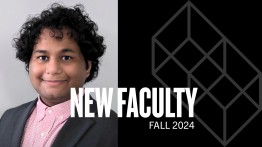Meet Abhishek Sharma, Assistant Professor, Chemical Engineering
POSTED ON: August 12, 2024

This fall the Albert Nerken School of Engineering is excited to welcome a new tenure-track faculty member in chemical engineering. Abhishek Sharma received his Ph.D. from Cornell University in 2021 and has since then been a postdoctoral scholar at the Pritzker School of Molecular Engineering at the University of Chicago. Interested in teaching, scientific communication, and art, Assistant Professor Sharma’s artwork has graced the covers of multiple American Chemical Society journals such as The Journal of Physical Chemistry and Infectious Diseases.
Tell us about your research interests.
As a computational scientist, I am interested in emergent properties of systems with simple rules and constraints. If I were to put my research mission in one statement, it is to capture the weird and wonderful aspects of nature where the whole is greater than the sum of its parts. All around us, we find global phenomena that emerge out of features of small-scale units: about a hundred different kinds of atoms lead to complex chemical systems, which in turn lead to even more complicated living systems. I largely work in the context of stimulus-responsive materials with two distinct approaches:
- Bottom-up design: designing nanoparticles that can be used as building blocks to generate order and structure, with applications in manipulation of light (photonics) and understanding phase transitions.
- Top-down design: using additive manufacturing techniques, such as 3D printing, we can create intricate structures for complex functions that go beyond naturally occurring materials. I am interested in designing such metamaterials (beyond-materials) with unusual mechanical properties: materials that are strong yet light, block sound, and perhaps even form clothing that is self-fitting!
Beyond the pure scientific work, I am interested in a couple of interdisciplinary projects including the use of novel materials and technology in artistic and architectural contexts and how best to equip future engineers to assess the ethical considerations of their work such as product life cycles and societal and environmental impact.
What brought you to The Cooper Union?
The answer is in the name: The Cooper Union for the Advancement of Science and Art. I am a trained chemical engineer through and through. Yet, I have often found myself gravitating towards broad interests that span traditional disciplines. While on my journey as an engineer, I also found myself venturing into the humanities and arts. I have always envisioned an ideal home institution with a strong inherent commitment to interdisciplinarity, and The Cooper Union is one of the best at realizing this vision. So when I saw the job offer, I had to apply! What made it even more personally resonant with me were the values of positive social impact and improving access to education. I am a product of institutions and programs that financially supported my education at every level, an education that would otherwise not be possible for someone with my background originating in the Global South. I believe that education access is a powerful tool for meaningful socio-economic mobility. I am more than glad to find a home in an institution that uniquely supports these values in conjunction with excellence in teaching and scholarship.
What aspects of teaching are you most excited about in the coming academic year at Cooper?
There is a lot to be excited about! I am happy to have the opportunity to teach the Transport sequence for chemical engineering juniors: Fluid Mechanics in the Fall, and Heat and Mass Transfer in the spring. These are classic chemical engineering courses conceived about a century ago, and I have always wondered how to reimagine them in the modern context. Thus, I am looking to bring my computational and science communication background to these courses. I will be teaching how code can help in improving understanding of otherwise abstract mathematical contexts. I will also be using evaluation elements that encourage effective communication of the engineering principles behind day-to-day transport phenomena. For example, students will learn how to communicate the chemical engineering principles underlying a siphon coffee machine. I believe such exercises will lead to our graduates becoming more capable of explaining complex ideas and improving the public understanding of engineering.
I also look forward to teaching electives relating to my research. In the fall, I will teach a theory and simulations course on phase transitions. From the condensation of water vapor on a cold surface to the freezing of water into ice, phase transitions are all around us. In engineering contexts, we find phase transitions at the core of refrigeration/heat pump cycles, separation processes such as distillation and liquid-liquid extraction, and phase change materials for energy storage. These topics are generally reserved for advanced research, but I am hoping that I can make them accessible as they are becoming increasingly important in both industrial applications and fundamental research in chemical engineering.
I am also looking forward to advising students on a variety of research projects. They provide a unique opportunity to explore concepts in-depth and cultivate research skills. Scientific discovery is a rewarding pursuit, and a unique benefit of being a professor is sharing that with my students.




